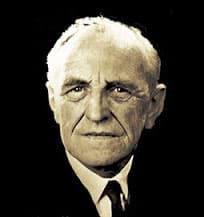Donald Winnicott
Donald Winnicott (1896 – 1971) was a British psychoanalyst and paediatrician, best known for his theories of child development, and for his influence in the development of object relations theory.
The phrase “the good enough mother” emerged from Winnicott’s work, and he placed emphasis of the role of early relational experiences, especially with key caregivers, in the development of personality.
Here are some of the key areas of Winnicott’s thinking:

Object Relations
Object relations theory was developed by Melanie Klein and theorises that infants internalise those around them as ‘objects’.
For example, the mother may be internalised as a caring and nurturing presence, and those who remind the child of the ‘mother’ object might be expected to respond in the same way. The introjected mother becomes a template to help the child make sense of other relationships.
Winnicott built on Klein’s findings by deepening understanding of the relationship between the mother’s* responsiveness and attunement to an infant, and the way the child comes to view themselves.
Winnicott theorised that the child’s self-concept grew from their experience of their mother’s attitudes and feelings towards them.
If a mother is attuned to the infant, and responsive to their cues (e.g. crying), the child will learn that they can affect their environment – they would experience themselves as omnipotent.
Winnicott believed that the mother and baby should not be viewed as separate entities but as one single object; as he famously wrote: “There is no such thing as a baby, there is a baby and someone.”
Experience of Omnipotence
An infant experiences omnipotence when they become aware that they can affect their environment in order to get their needs met.
If a baby who is crying because of a soiled nappy learns that their cries will be met consistently with a nappy change, they feel a sense of being ‘real’ in their environment – that they exist and have agency.
If an infant’s needs are not consistently met, Winnicott understood that this sense of omnipotence would not develop, and the infant would instead switch focus to the needs of the mother.
The infant would learn that they must meet the needs of the mother and be who the mother wants them to be in order to get their needs met. Winnicott theorised that this would lead to the development of the false self.

Equally, Winnicott noted that an overbearing caregiver, too eager to meet the needs of the infant may stifle their sense of ‘self’ as an individual, and hamper the growth of independence. This scenario would also contribute to the development of a false self.
The ‘good enough mother’ would be one who consistently meets the needs of the infant, but does not do so with absolute perfection. This allows space for the infant to develop a sense of themselves as autonomous and separate from their mother.
Transitional Objects
A transitional object is an object, such as a toy or blanket, which represents the mother object when the caregiver is absent, and its presence gives the infant the security and confidence to exercise their omnipotence and act independently, taking care of themselves.
Transitional objects may be used similarly in therapy, representing the therapist or therapy space and helping clients to manage between sessions or during breaks.
Psychic Functioning
Winnicott highlighted the centrality of the mother’s psychic functioning in the development of the infant’s psychological processes.
Winnicott believed that the mother and baby should not be viewed as separate entities but as one single object; as he famously wrote (1966): “There is no such thing as a baby, there is a baby and someone.”
Due to this unity, the infant's psychological development is closely connected to the psychic functioning of the mother.
Winnicott saw psychotherapy as a reparative process whereby the psychotherapist takes the role of the good enough mother.
For this reason, exploring the interpsychic functioning between therapist and client may become an important part of the process when working from a Winnicottian perspective (Winnicott et al, 2017).
*‘Mother’ in this context can be understood as shorthand for any primary caregiver.
Free Handout Download
Donald Winnicott's True and False Self
Reference
Winnicott, D. W. (1966) The Family and Individual Development. New York: Basic Books.
Winnicott, D., Caldwell, L., Robinson, H., Adès, R. & Kabesh, A. (2017). The collected works of D.W. Winnicott. Oxford New York: Oxford University Press.
This article was written for Counselling Tutor by Erin Stevens